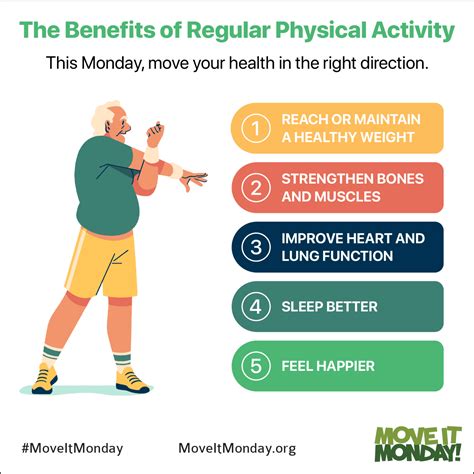Nowadays, more and more people are becoming increasingly aware of the immense value of leading an active lifestyle. Engaging in physical activities on a regular basis provides a myriad of advantages that extend far beyond the realms of a healthy body. In fact, exercise proves to be a powerful catalyst for both physical and mental well-being, enriching our lives in numerous ways.
Embracing a habit of regular exercise can do wonders for our overall vitality and energy levels. It invigorates our bodies and imbues us with a renewed sense of vigor, making us feel strong and capable. Whether it's engaging in cardiovascular exercises, strength training, or even participating in sports activities, each form of exercise contributes to boosting our physical prowess and enhancing our endurance.
Moreover, exercise plays a significant role in improving our emotional well-being. It acts as a potent stress buster by releasing endorphins – the feel-good hormones that alleviate feelings of anxiety and depression. Through regular physical activity, we can cultivate a sense of emotional balance and reduce the impact of negative emotions on our daily lives. This, in turn, enables us to face life's challenges with greater resilience and maintain a positive outlook.
Physical Benefits of Regular Exercise

Engaging in regular physical activity brings numerous positive impacts on your body and physical well-being. By implementing a consistent exercise routine, you can enhance your overall physical health and improve various aspects of your body. Exercise plays a pivotal role in improving your body's functionality, efficiency, and resilience, leading to various physical advantages.
Firstly, regular exercise promotes cardiovascular health, strengthening your heart and improving blood circulation. Physical activity stimulates the heart to pump more efficiently, ensuring a steady supply of oxygen and nutrients to every part of your body. Consequently, your cardiovascular system becomes stronger, reducing the risk of heart diseases, high blood pressure, and other related ailments.
In addition, exercise aids in maintaining a healthy weight, as it helps to burn calories and boost metabolism. By increasing your physical activity levels, you can effectively manage your weight and prevent excessive weight gain. Regular exercise can also assist in building lean muscle mass, increasing your body's strength and endurance.
Furthermore, engaging in physical activity helps to enhance bone density and strengthen your bones, reducing the risk of osteoporosis and fractures. By subjecting your bones to weight-bearing exercises such as walking, running, or weightlifting, you stimulate the production of new bone tissue, making your skeletal system stronger and more resilient.
Moreover, regular exercise plays a crucial role in improving flexibility and joint mobility. Stretching exercises and activities such as yoga or Pilates increase muscle flexibility, enhancing your range of motion and preventing stiffness. This, in turn, reduces the likelihood of injuries and improves overall mobility.
Lastly, participating in regular physical activity can boost your overall energy levels and promote better sleep patterns. Exercise stimulates the production of endorphins, also known as "feel-good" hormones, and improves sleep quality, allowing you to wake up feeling refreshed and energized.
In conclusion, incorporating regular exercise into your lifestyle brings about numerous physical benefits. From improving cardiovascular health and maintaining a healthy weight to enhancing bone density and promoting flexibility, exercise plays a vital role in strengthening your body and improving physical well-being.
Mental Health Benefits of Engaging in Regular Physical Activity
Regular physical activity plays a crucial role in maintaining and improving one's overall mental well-being. Engaging in consistent exercise routines not only helps boost mood and alleviate symptoms of stress, anxiety, and depression, but it also enhances cognitive function and promotes better sleep patterns.
1. Enhanced Mood: Regular physical activity stimulates the production of endorphins, which are known as "feel-good" hormones. This leads to an improved sense of well-being, increased self-confidence, and a more positive outlook on life.
2. Stress Reduction: The act of exercising helps to reduce the production of stress hormones such as cortisol and adrenaline, while promoting the release of endorphins. This effectively minimizes feelings of tension and stress, allowing one to better cope with daily challenges.
3. Anxiety Relief: Engaging in physical activity triggers the release of neurotransmitters like serotonin, dopamine, and norepinephrine, which are essential in regulating mood and anxiety. Regular exercise can significantly reduce symptoms of anxiety disorders and improve overall mental well-being.
4. Depression Management: Physical activity has been shown to be an effective adjunct therapy for individuals experiencing symptoms of depression. Exercise helps to increase the production of endorphins, neurotransmitters, and growth factors, all of which contribute to alleviating depressive symptoms and improving mood.
5. Cognitive Function: Regular physical activity stimulates blood flow to the brain and enhances the growth and connectivity of brain cells. This results in improved memory, focus, attention, and overall cognitive function.
6. Quality Sleep: Engaging in regular exercise promotes better sleep patterns and can help alleviate sleep disorders such as insomnia. Physical activity raises body temperature, which then promotes a more restful and deep sleep, leading to increased energy levels, alertness, and overall mental well-being throughout the day.
The mental health benefits of regular exercise cannot be overstated. By incorporating physical activity into your daily routine, you can experience improved mood, reduced stress and anxiety, better cognitive function, and enhanced sleep, all of which contribute to a healthier and happier mindset.
Increased Energy and Stamina through Regular Exercise

Enhancing vitality and endurance are significant advantages one can achieve by engaging in consistent physical activity. Regular exercise contributes to an amplified level of liveliness and resilience, promoting an overall sense of well-being. By incorporating a variety of exercises into one's routine and maintaining consistency, individuals can experience a noticeable increase in their energy levels and stamina. |
Regular Physical Activity: A Crucial Element for Managing Weight
Engaging in regular physical activity is essential for maintaining a healthy weight. By incorporating regular exercise into your daily routine, you can effectively manage and control your body weight. Through consistent physical exertion, you can enhance your metabolism, build muscle mass, and burn excess calories.
Achieving your desired weight and maintaining it requires more than simply adjusting your diet. Regular exercise not only helps you shed unwanted pounds, but it also strengthens your cardiovascular system, improves overall body composition, and boosts your energy levels.
| Benefits of Regular Exercise for Weight Management | |
|---|---|
| 1. Enhanced Metabolism: | Regular physical activity increases your metabolic rate, enabling your body to efficiently process and utilize the food you consume. |
| 2. Muscle Development: | Engaging in strength training exercises promotes the growth of lean muscle mass, which in turn helps to burn calories even at rest. |
| 3. Calorie Burning: | Exercise aids in burning calories, creating a calorie deficit that is crucial for weight loss and weight management. |
| 4. Cardiovascular Health: | Regular aerobic exercise strengthens your heart and improves cardiovascular health, reducing the risk of obesity-related diseases. |
| 5. Increased Energy Levels: | Physical activity releases endorphins, which boost energy levels and improve mood, making it easier to maintain an active lifestyle. |
Incorporating regular exercise into your daily routine not only helps you achieve your weight management goals but also has numerous additional health benefits. It is important to consult with a healthcare professional or a certified fitness instructor to devise a personalized exercise plan that suits your fitness level and goals.
Improved Sleep Quality with Regular Exercise

Enhanced Rest Duration through Consistent Physical Activity
Consistent physical activity has been proven to positively impact the overall duration and quality of sleep. Engaging in regular exercise helps regulate the body's internal clock, promoting a more consistent sleep pattern. By incorporating physical activity into your daily routine, you can improve the quality and length of your sleep.
| Better Sleep Efficiency | Reduced Sleep Disorders | Enhanced Mental Well-being |
|---|---|---|
| Regular exercise can improve sleep efficiency, meaning you spend less time lying awake in bed and fall asleep faster. This allows for more productive and restorative sleep, leading to increased energy levels during the day. | Engaging in physical activity on a regular basis has been linked to a reduced risk of developing sleep disorders such as insomnia. It can also alleviate symptoms of existing sleep disorders, providing relief and improving overall sleep quality. | Regular exercise is associated with enhanced mental well-being, including reduced stress levels and improved mood. These positive mental health outcomes can contribute to better sleep quality and a more relaxed state before bedtime. |
Incorporating regular exercise into your lifestyle can have substantial benefits for your sleep quality. By optimizing sleep duration, efficiency, and reducing the risk of sleep disorders, you can experience improved physical and mental health, resulting in a more balanced and rejuvenating overall well-being.
Enhancing Your Immune System Through Regular Physical Activity
Engaging in frequent physical activity can have a significant impact on your body's ability to defend against illnesses and infections. By incorporating regular exercise into your lifestyle, you can bolster your immune system, which serves as your body's natural defense mechanism.
1. Strengthen Your Defenses:
- Regular physical activity helps to strengthen the immune system by increasing the production of antibodies and white blood cells.
- Exercise stimulates the release of endorphins, which are neurotransmitters that help to reduce stress and enhance your overall well-being.
- By promoting better circulation, exercise ensures that immune cells travel efficiently throughout your body, allowing them to detect and eliminate harmful pathogens.
2. Reducing the Risk of Chronic Conditions:
- Regular exercise can help to lower the risk of chronic diseases such as heart disease, diabetes, and obesity.
- These conditions can weaken the immune system, making individuals more susceptible to infections.
- By maintaining a healthy weight and keeping cardiovascular health in check through regular exercise, you can protect yourself and enhance your immune system.
3. Boosting Mental Well-being:
- Regular physical activity has been shown to improve mental well-being by reducing symptoms of anxiety and depression.
- When your mental health is in good condition, it positively affects your immune system.
- Lower stress levels contribute to a stronger immune response, as chronic stress can impair immune function.
4. Quality Sleep:
- Regular exercise has been linked to improved sleep quality and duration.
- Adequate rest is essential for a healthy immune system, as it allows your body to repair and recharge.
- By incorporating exercise into your routine, you can experience better sleep, which in turn contributes to a more robust immune system.
By engaging in regular physical activity, you can optimize your immune system, reduce the risk of chronic conditions, boost your mental well-being, and improve your sleep quality. Remember to consult with a healthcare professional before starting any new exercise program to ensure it aligns with your individual needs and capabilities.
Social Benefits of Regular Exercise: Stay Connected

Engaging in regular physical activity not only has positive effects on your health and well-being, but it also offers a range of social benefits that help you stay connected with others.
Regular exercise provides opportunities for social interaction and enhances your social connections. Whether you participate in group fitness classes, team sports, or join a walking or running club, exercising alongside others creates a sense of community and fosters friendships. Sharing common goals and experiences with fellow exercisers can strengthen social bonds and lead to lasting relationships.
Furthermore, regular exercise can contribute to an improved social life by providing opportunities for socializing outside of exercise sessions. After a workout, you may find yourself engaging in post-exercise conversations, grabbing a coffee with your exercise buddies, or planning activities together. The socializing aspect of exercise can enhance your overall well-being and bring a sense of enjoyment to your fitness routine.
Additionally, participating in regular exercise can expose you to new social environments and diverse groups of people. Whether you join a gym, a local sports league, or attend fitness events, you have the chance to meet individuals from different backgrounds and with different interests. This exposure encourages cultural exchange, broadens your perspectives, and promotes inclusivity.
Regular exercise also offers social benefits outside of face-to-face interactions. With the advent of technology, various online platforms and fitness communities have emerged, providing opportunities for individuals to connect and support each other virtually. Through online challenges, forums, and social media groups, you can find like-minded individuals who share your fitness goals and offer motivation and encouragement.
In summary, in addition to its numerous physical and mental health benefits, regular exercise brings about a wide range of social advantages. From building a sense of community and fostering friendships to expanding your social circle and enjoying virtual connections, staying active helps you stay connected and leads to a more fulfilling and social life.
FAQ
What are the benefits of regular exercise?
Regular exercise has numerous benefits for both physical and mental health. It helps improve cardiovascular health, strengthen muscles and bones, boost the immune system, and increase energy levels. Exercise also reduces the risk of chronic diseases, such as heart disease, diabetes, and certain types of cancer. In terms of mental health, exercise can alleviate symptoms of depression and anxiety, improve mood, and enhance cognitive function.
How often should I exercise to reap the health benefits?
To reap the health benefits of exercise, it is recommended to engage in moderate-intensity aerobic activity for at least 150 minutes per week or vigorous-intensity aerobic activity for 75 minutes per week. It is also beneficial to include strength training exercises at least two days per week. However, it's important to keep in mind that any amount of physical activity is better than none, so even small increments can make a difference.
Can exercise help with weight management?
Absolutely! Regular exercise plays a key role in weight management. When combined with a healthy diet, exercise helps to burn calories, build muscle, and increase metabolism. It can also promote the preservation of lean body mass, which is crucial in maintaining a healthy weight. Additionally, exercise helps to prevent weight regain after weight loss by reducing appetite, improving insulin sensitivity, and enhancing overall body composition.
What are some tips to stay motivated and consistent with exercise?
Staying motivated and consistent with exercise can sometimes be challenging, but there are several strategies that can help. First, set realistic and achievable goals. Break them down into smaller milestones to stay motivated. Find activities you enjoy and mix them up to prevent boredom. Make exercise a social activity by finding a workout buddy or joining group classes. Additionally, track your progress and reward yourself for reaching milestones. Lastly, remember that consistency is key, so schedule exercise into your routine and make it a priority.
Are there any risks or precautions associated with regular exercise?
While regular exercise is generally safe for most people, there are some precautions to keep in mind. It is important to start slowly and gradually increase intensity to avoid injury. If you have any existing health conditions or concerns, it's always wise to consult with your healthcare provider before starting a new exercise program. It's also crucial to listen to your body and rest when needed. Stay hydrated, wear appropriate footwear, and use proper form to minimize the risk of accidents or overuse injuries.



